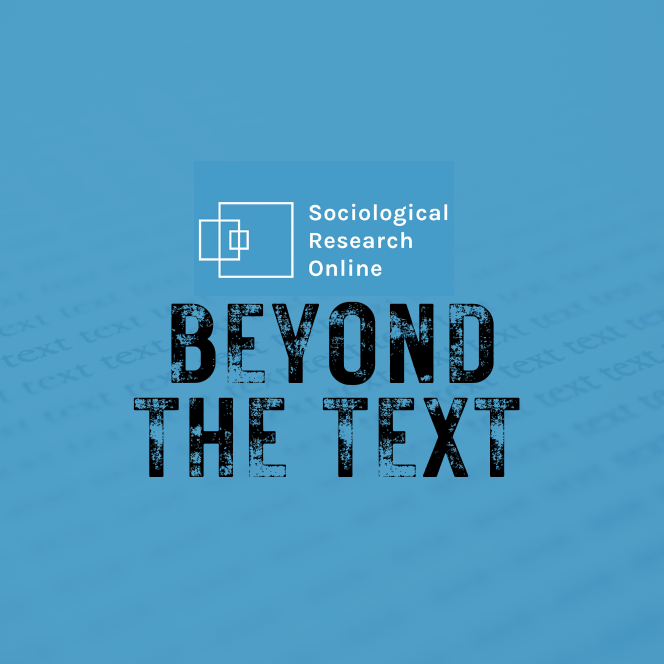Sociological Research Online has published a new special issue of creative outputs expressing sociological research participation and collaboration.
We are proud to launch a new publication format called Beyond the Text. This properly creative format builds on SRO’s pioneering role as an online-only journal, driven by our agenda of diversification, participation, and engagement.
Enriching the journal experience using enhanced media publishing, Beyond the Text provides a permanent digital journal space to host the wealth of creative outputs generated in social sciences research, including zines, films, animations, photographs, poems, audio pieces, and outputs that collectively capture the investments of all those involved in research. Beyond the Text provides a unique space where research participants, artists and producers can be acknowledged for their work in the formal journal context. As a free-to-view area in Sociological Research Online, these creative outputs will be accessible to people and organisations beyond traditional Higher Education contexts, often those with whom the research output has been produced. This new publication area provides a sustainable, accessible space for work which is often only shared with the key stakeholders of research, yet which has tremendous potential for impact beyond those contexts.
Background to Beyond the Text
Beyond the Text was developed to address a gap between research outputs and interventions. Where such outputs are audio-based, or non-textual, they rarely ‘translate’ into academic peer review publications beyond those concerned mainly with methodological reflection on the pragmatics, techniques, or ethics of the research. Rarely is such work presented in and of itself as an expression of research participation, collaboration, and output. The lack of a space to communicate the co-creation of research has not only been problematic for highly applied and participatory social sciences research, as well as for multi/interdisciplinary work across academic fields, but also for policy, voluntary and government sectors. Furthermore, the artists or producers themselves rarely enjoy an opportunity to have their work recognised or acknowledged in formal contexts. Despite the increasing emphasis of UKRI on impact agendas, sociological journals have been somewhat slow to respond to the need for such properly creative outlets for impact products; Beyond the Text addresses this gap.
Beyond the Text diversifies both the community of contributors, as well as new audiences, providing a new channel for audience engagement. As contributions to this publication format accumulate over time, it has the potential to become a properly creative academic archive, a record of the wider diversity of contributions often overlooked or ignored in REF, TEF, and other Higher Education auditing exercises.
Beyond the Text was proposed by the journal Editors at an Editorial Board meeting in November 2020, and shortly afterwards this team was formed to take the project forward. We developed a new format for outputs that include a ‘companion piece’. This provides an overview of the research from which it was developed, who and for what purposes it was designed, and some commentary on how this piece achieves those goals. Additionally, some account of how and by whom it was developed provides a form of ‘how to’ for other researchers interested in this approach, as well as ensuring proper attribution to artists and so forth. The companion piece is peer reviewed and does not exceed 3000 words.
Hence, the team needed to develop new review guidelines and even a new language of review. Acting as peer reviewers for the inaugural issue of Beyond the Text that is published here, we had an opportunity to reflect on what it means to review submissions that do not fit a familiar model of academic publication, for which there are no norms of peer review, and which, as finished products, can rarely be transformed through review. The development of the companion piece was where we felt we could help contributors frame their work. While initial the companion piece submissions appeared to show contributors at ease with situating their outputs in the sociological debates and research from which they emerged, as reviewers we found ourselves also wanting to know more about the piece itself, and how it speaks for itself. Consequently, our reviews were returned more as questions than suggestions: what does this piece say sociologically, what were the intention(s) behind its creation, how did the research team work together, and with others (research partners, creatives etc.) to develop the final outcome submitted to the journal.
As we grappled with this new format and novel approach to reviewing, we found ourselves turning to concepts of display and curation. We explored how each piece would sit on the website and alongside other contributions that may speak to similar themes or concerns. We wondered how sociological description and elaboration could help make that piece meaningful to a wider audience. This creative engagement with developing review guidelines will continue as we invite further submissions to Beyond the Text, working with new contributors and reviewers to help give insight into this new kind of review as it evolves for us and considering how it may work for others.
Submissions
SRO invites future submissions – read the submission guidelines for Beyond the Text pieces.
Submissions to this area include, but are not limited to:
- Products of participatory or socially engaged research, particularly of creative research collaborations
- Interventions, for the broad gamut of stakeholders of social sciences research
We would like to invite further submissions that are properly digital, such as:
- Photo-essays
- zines
- audio
- comics
- moving image
- literary works
- Other outputs with non-textual components
Beyond the Text team:
- Kahryn Hughes, SRO Editor-in-Chief
- Geraldine Brown, SRO Editorial Board Member
- Tim Butcher, SRO Editorial Board Member
- Edmund Coleman-Fountain, former SRO Editorial Board member and current Editor
- Ian R Lamond, SRO Editorial Board Member
- Helen Lomax, SRO Editorial Board Member
- Sophie Belfield, (previous) BSA Publications and Social Media Coordinator


